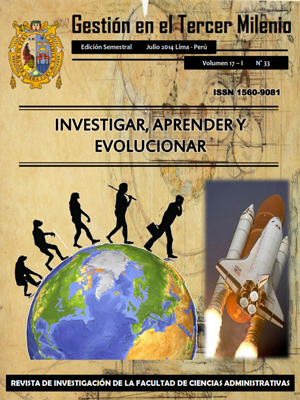LACK OF MOTIVATIONAL LEADERSHIP AT THE COMMUNE IN EMERGING LOCAL GOVERNMENTS FOR THE CONSTRUCTION OF A SHARED LOCAL VISION AND SYNERGISTIC NATURE OF HUMAN DEVELOPMENT AND INCLUSIVE
DOI:
https://doi.org/10.15381/gtm.v17i33.11676Keywords:
Motivational leadership, Participatory budgeting, local government, emerging local government, Local and Human DevelopmentAbstract
The relevance being taken by local governments in the globalized world of today in relation to the changing needs of the residents, needs ranging from health, education, work, security, environmental protection, territoriality, including technology services administrative, commoditization of resources of the district administrative productivity through transparent, and attitude in the organizational and institutional behavior away from vices such as corruption, favoritism and nepotism and internal political sectarianism in the municipalities. These changing needs that arise in day to day neighboring communes are becoming stronger and more urgent day and exert greater pressure on management systems of local governments, manifesting greater demand in emerging local governments. Local governments are now in the need to develop strategies to attract investment in their territories, develop plans, programs and investment projects that give value to their natural resources and comparative advantages, so that these are generated social economic synergy that impact and gradual improvement in the benefit of local development and standard of living of its population. Such needs were the basis of inspiration for the participatory budget law for the purposes of accommodating neighbors with their proposals for local development projects based on addressing the needs of the local population, be they the who truly suffer and suffer dissatisfaction social needs. Often the political authorities of the municipal government, government plans have been developed in relation to the current problems of the district; Most government plans presented in local governments is present mayor of vision and short and medium run, this time because of municipal governments are really short, in this sense the long view term only fit on the possibility of re-election of the mayor, However one of the most important requirements for local development is the continuation of works, development and formulation of new projects that have been proposed involving the residents of the community and have managed to include in the budget concluded while the longer stay included in the general budget of the emerging local government , especially trying to capitalize on these projects the potential for the instrument the municipality, and that the measures possible, “existing projects to be synergistic nature between them and, broadly inclusive, in order to be gaining Development Local and improving the standard of living of the residents of the municipalit Unfortunately the proposed works for the emerging district often is based on the policy proposals of the government plan of movement or political party elected mayor. Often these works are also handled with corrupt actions with certain economic favors to the rise to power of the mayor are paid. When this happens, the priority factor vanishes needs while there are no more resources to carry out the projects that the municipality raises. To achieve these goals the leaders of localities should be prepared in formal spaces and their work based on the principle of “obeying” territories, i.e. respecting the chain of command orders, being based on these agreements decided by the superiority under these agreements to contain in turn agreements neighbors which means that the prune, oriented over the service of all, is also the manifestation of the feeling of the will of the municipality, as Giulio Giraldi argues.Downloads
Published
Issue
Section
License
Copyright (c) 2014 Juan Manuel Barreda Guerra

This work is licensed under a Creative Commons Attribution-NonCommercial-ShareAlike 4.0 International License.
THE AUTHORS RETAIN THEIR RIGHTS:
(a) The authors retain their trademark and patent rights, and also over any process or procedure described in the article.
(b) The authors retain the right to share, copy, distribute, execute and publicly communicate the article published in Gestión en el Tercer Milenio journal (for example, place it in an institutional repository or publish it in a book), with acknowledgment of its initial publication in the Gestión en el Tercer Milenio.
(c) Authors retain the right to make a subsequent publication of their work, to use the article or any part of it (for example: a compilation of their work, lecture notes, thesis, or for a book), provided that they indicate the source. of publication (authors of the work, magazine, volume, number and date).













